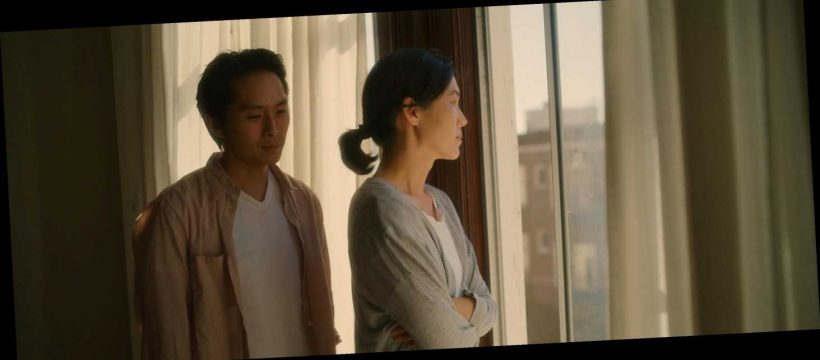Chiseled as a haiku, director Wayne Wang’s “Coming Home Again” opens a window onto dying days in all their ugliness, but also onto their possibility of redemption for a mother and son. Formally impeccable and observant, the “Joy Luck Club” filmmaker’s latest wastes none of its 85 minutes in unpeeling the relationship between Chang-rae (Justin Chon) and his ailing mom (Jackie Chung). At the heart of this Ozu-esque drama is Chung, who supplies a heartbreaking performance as a woman trying to make up for lost time, while also trying to explain to her son why time slipped from under her in the first place, leaving behind some potent maxims and Korean recipes in the process.
“Coming Home Again” is co-written by Wang and the real Chang-rae Lee from his moving 1995 New Yorker essay. The movie transplants that piece’s late-1980s period to present-day San Francisco, the now-gentrified hub to the Bay Area tech bubble that has all but engulfed the city’s multicultural foundation. Chang-rae has abandoned his life as a writer in New York to care for his mother, now bedridden with cancer and unable to so much as lift herself out of bed while her husband works as a psychiatrist. Chang-rae is bitter about leaving behind his East Coast life — one far more westernized and remote from his South Korean immigrant heritage — but more angry at himself for his squandered potential.
His new, makeshift life as a caregiver in San Francisco is a carefully mapped-out routine, beginning and ending in a lonely key. But a constant in his regimen is recreating his mother’s beloved Korean recipes, including kalbi, a piquant, gingery dish of marinated short rib, that kicks the movie off on a mouthwatering level. Which is curious, given that this is ultimately a grief drama, but there’s pleasure to be had in the culinary imagery, and it fits the context: Most of their lives, Chang-rae and his mother have communicated through food, and tradition.
But now, as communicated through elliptical flashback, all that was buried under the rug is coming out, with resentments and regret surfacing all around. His mother has a lot of questions for the prodigal Chang-rae, who left San Francisco at a young age for boarding school in New York. (“Why didn’t we meet your friends?” “You never talk about your girlfriend.”) Getting those questions answered is another story, because these two are running out of time. Some of the back-and-forths between mother and son take on a question-and-answer-session quality that tells more than it shows, even if it’s always in service of catching us up on decades of a life shared in under an hour and a half.
“Coming Home Again”
Outsider Pictures
Wang and editors Ashley Pagan and Deirdre Slevin flip back and forth between past and not-so distant present, as Chang-rae first learns of the news of his mother’s metastasizing cancer, and his family wrestles to control it. Other jealousies bubble up. Chang-rae’s panicked sister accuses him of being “the favorite.” Hushes that his father may have cheated on his wife also boil over. Meanwhile, their mother is in agony. This is not a happy home, but Wang doesn’t dwell in the awful particulars. Instead, with cinematographer Richard Wong, he waits coolly for tacit truths to reveal themselves. “Coming Home Again” is at its most aching and real when watching routine play out from afar, or normalcy try to recalibrate itself inside the house, whether when Chang-rae’s mother, very sick and frustrated, tries to paint her toenails, or he attempts to make kalbi but can’t get the recipe or method exactly right.
During a New Year’s Eve dinner, everything falls apart, and it’s Chung’s moment. Her turn as a woman getting lost to time and disease is a devastating tower of art on its own. Especially in moments where she reveals truths about her immigrant past to Chang-rae, like abandoning her life in Korea for America, Chung conveys an ocean of feeling even when nothing’s being said. But the screenplay affords her plenty of gutting maxims that will likely haunt Chang-rae for eternity. “You can fall out of love and go back,” she tells her son. “But it’s never the same.”
Chung’s understated performance is a fitting center for a movie almost always operating at whisper-level. “She knew that the flavor of a good dish developed not at once but in stages,” Chang-rae Lee wrote of his mother in the New Yorker essay. Wang seems to have applied that strategy to his latest movie, with a complex slow burn that sneaks up on you.
Grade: B+
“Coming Home Again” opens in virtual cinemas on October 23. Head to Outsiders Pictures’ website for a complete list of participating theaters.
Source: Read Full Article


